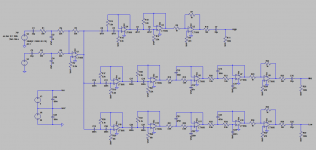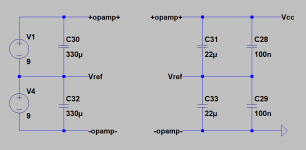I'm going to build a new preamp which will contain 7 dual opamps (TL072 and NJM2068 .... yes, it is a low cost project).
The opamp stages will work as
- mono summer
- 3 way 24db x-over
- output buffers.
That thing will be powered by two 9V batteries with a center tap.
Should i add capacitors to the +- power rails to gnd at each opamp?
Or is it not neccesary with the batteries?
Which capacitor type and which value would be best?
The opamp stages will work as
- mono summer
- 3 way 24db x-over
- output buffers.
That thing will be powered by two 9V batteries with a center tap.
Should i add capacitors to the +- power rails to gnd at each opamp?
Or is it not neccesary with the batteries?
Which capacitor type and which value would be best?
As in standard pre amps, it probably won't make any difference at each op amp. Make sure the rails have a 100nF cap across each to reduce hiss from the batteries, if any. I would use 100nF 50 volt ceramic or tantalum bead. There is no current drive required so no need for high value tank capacitors.
Caps from rails to signal ground can be problematic with opamps due to their classAB operation - nasty half-wave rectified audio appears on the rails and the caps can couple it into the signal gnd. Keep the filter network impedances as high as possible to minimize the disturbances - not too difficult with JFET opamps like TL072.
Thank you guys for your replies.
I get the impression that there is no consensus on that topic.
As far as i understand what you write, it might be (/is) better to completely omit the caps.
Is what abraxalito writes about high impedances independent from the decoupling topic?
How high is high impedance in a sallen-key filter?
Should i better use 1k resistors or 47k resistors?
....damn this is getting complicated.
I get the impression that there is no consensus on that topic.
As far as i understand what you write, it might be (/is) better to completely omit the caps.
Is what abraxalito writes about high impedances independent from the decoupling topic?
How high is high impedance in a sallen-key filter?
Should i better use 1k resistors or 47k resistors?
....damn this is getting complicated.
I'd suggest decouple because 9V batteries have fairly high internal resistance but be careful to keep power ground routing separate from signal ground. I'd aim for resistor values at least 100k.
Impedances are not separate from the topic of decoupling since with heavier loads there's more requirement for decoupling. Keep loads very light and then decoupling's less critical.
Impedances are not separate from the topic of decoupling since with heavier loads there's more requirement for decoupling. Keep loads very light and then decoupling's less critical.
There is no absolute right or wrong answer. It depends ..... like so many things in engineering.
What's wrong with adding provision for a few caps for each rail on the pcb, but not fitting them unless you have problems with noise, oscillation etc? Added cost for provision >> zero.
I have always added a 2.2uF tantalum bead or 100nF ceramic disc close at each op-amp depending on whether an LF or HF circuit. (Days past and industrial applications).
I have NEVER had a problem attributable to poor op-amp decoupling. Were most of them unnecessary? Probably! Do I care? No!
What's wrong with adding provision for a few caps for each rail on the pcb, but not fitting them unless you have problems with noise, oscillation etc? Added cost for provision >> zero.
I have always added a 2.2uF tantalum bead or 100nF ceramic disc close at each op-amp depending on whether an LF or HF circuit. (Days past and industrial applications).
I have NEVER had a problem attributable to poor op-amp decoupling. Were most of them unnecessary? Probably! Do I care? No!
I attache the LTSpice file and a pic of the circuit diagram.
The component values may change, but you might get an idea of my plan.
Please take a look at the psu part on the bottom left.
Is the decoupling meant like this or should a single cap go from vcc to gnd?
My plan is (/was) to use the TL072's for the summer and the buffer stages.
The filters should have NJM2068's.
(I'm too lazy to import the spice-models of the opamps.)
Is that a wise choice?
(within the limiting condition that i don't want to pay more for the opamps).
I originally planned with quite low resistor values especially on the path for highs, because i'm aware of thermal noise.
Taking into account what abraxalito wrote before, it seems like i need to re-adjust my choice.
The component values may change, but you might get an idea of my plan.
Please take a look at the psu part on the bottom left.
Is the decoupling meant like this or should a single cap go from vcc to gnd?
My plan is (/was) to use the TL072's for the summer and the buffer stages.
The filters should have NJM2068's.
(I'm too lazy to import the spice-models of the opamps.)
Is that a wise choice?
(within the limiting condition that i don't want to pay more for the opamps).
I originally planned with quite low resistor values especially on the path for highs, because i'm aware of thermal noise.
Taking into account what abraxalito wrote before, it seems like i need to re-adjust my choice.
Attachments
Thermal noise from resistors is hardly going to be an issue in a line-level (say 1-2VRMS) circuit. I'd use TL072 (or TL074/TL084 because its even cheaper) throughout except for the output drivers. TL072 really is poor at driving any kind of load.
Your decoupling looks fine but I'd exchange the caps you have for electrolytics, say 470uF/16V.
Your decoupling looks fine but I'd exchange the caps you have for electrolytics, say 470uF/16V.
Add supply rail capacitors at the batteries to attenuate the noise coming from the batteries.
100uF to 220uF across each battery will be in the ball-park.
Add HF supply rail decoupling at the opamp. 100nF to 220nF at each opamp supply pin connected together to create a power ground plane at the opamp.
Add MF supply rail decoupling fairly near the opamp. 10uF to 47uF and connected to that power ground plane.
Do not omit any of these unless the opamp manufacturer tells you in their datasheet.
100uF to 220uF across each battery will be in the ball-park.
Add HF supply rail decoupling at the opamp. 100nF to 220nF at each opamp supply pin connected together to create a power ground plane at the opamp.
Add MF supply rail decoupling fairly near the opamp. 10uF to 47uF and connected to that power ground plane.
Do not omit any of these unless the opamp manufacturer tells you in their datasheet.
- Status
- Not open for further replies.
- Home
- Source & Line
- Analog Line Level
- Battery powered active x-o. To decouple or not to decouple?

